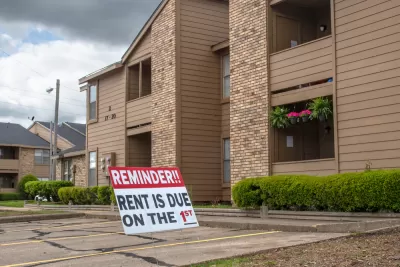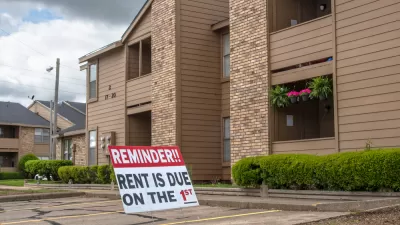The Biden administration is promising a "whole-of-government" approach to prevent an impending wave of displacement and effectively distribute rental assistance.

"The Biden administration announced today that it will extend the federal eviction moratorium issued by the Centers for Disease Control and Prevention (CDC) through July 31, and it will implement a whole-of-government approach to prevent a historic wave of evictions this summer," according to a press release from the National Low Income Housing Coalition (NLIHC). "Extending the eviction moratorium through July gives state and local governments more time to distribute more than $46 billion in emergency rental assistance (ERA) to those most in need." The CDC says the extension is intended to be the last in a series of moratoriums meant to prevent evictions during the COVID-19 pandemic.
Additional actions include:
- Convene a summit to bring together local teams to develop eviction-prevention action plans.
- Issue new guidance from Treasury for the ERA program to accelerate and broaden state and local delivery of funds.
- Have the Department of Justice send guidance to state courts encouraging them to adopt anti-eviction diversion practices.
- Provide guidance from HUD to help prevent Fair Housing Act violations related to evictions.
- Activate a whole-of-government effort to raise awareness about emergency rental assistance, tapping agencies including Treasury, HUD, CFPB, DOJ, and USDA to inform tenants and landlords of available support.
According to NLIHC, "At least 6 million renter households are still behind on rent: state and local governments must use the next month to quickly and aggressively strengthen their emergency rental assistance programs to avert an historic wave of evictions this summer and fall."

Alabama: Trump Terminates Settlements for Black Communities Harmed By Raw Sewage
Trump deemed the landmark civil rights agreement “illegal DEI and environmental justice policy.”

Planetizen Federal Action Tracker
A weekly monitor of how Trump’s orders and actions are impacting planners and planning in America.

The 120 Year Old Tiny Home Villages That Sheltered San Francisco’s Earthquake Refugees
More than a century ago, San Francisco mobilized to house thousands of residents displaced by the 1906 earthquake. Could their strategy offer a model for the present?

In Both Crashes and Crime, Public Transportation is Far Safer than Driving
Contrary to popular assumptions, public transportation has far lower crash and crime rates than automobile travel. For safer communities, improve and encourage transit travel.

Report: Zoning Reforms Should Complement Nashville’s Ambitious Transit Plan
Without reform, restrictive zoning codes will limit the impact of the city’s planned transit expansion and could exclude some of the residents who depend on transit the most.

Judge Orders Release of Frozen IRA, IIJA Funding
The decision is a victory for environmental groups who charged that freezing funds for critical infrastructure and disaster response programs caused “real and irreparable harm” to communities.
Urban Design for Planners 1: Software Tools
This six-course series explores essential urban design concepts using open source software and equips planners with the tools they need to participate fully in the urban design process.
Planning for Universal Design
Learn the tools for implementing Universal Design in planning regulations.
Clanton & Associates, Inc.
Jessamine County Fiscal Court
Institute for Housing and Urban Development Studies (IHS)
City of Grandview
Harvard GSD Executive Education
Toledo-Lucas County Plan Commissions
Salt Lake City
NYU Wagner Graduate School of Public Service





























